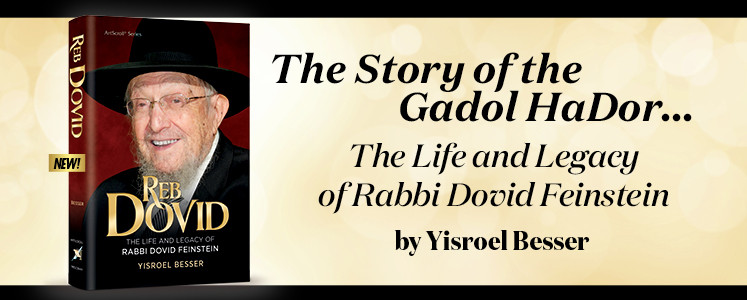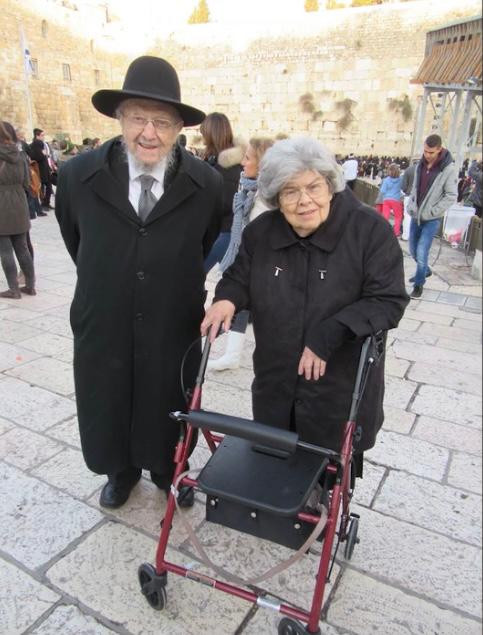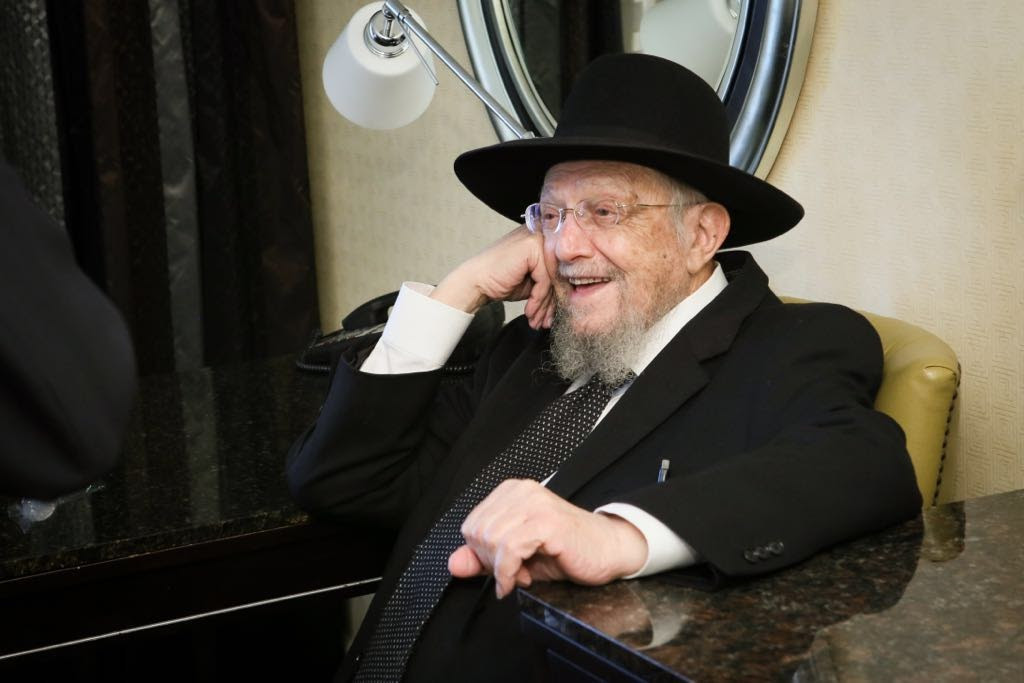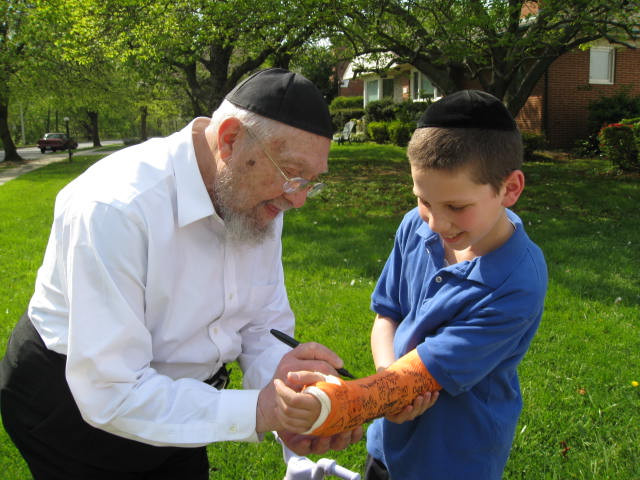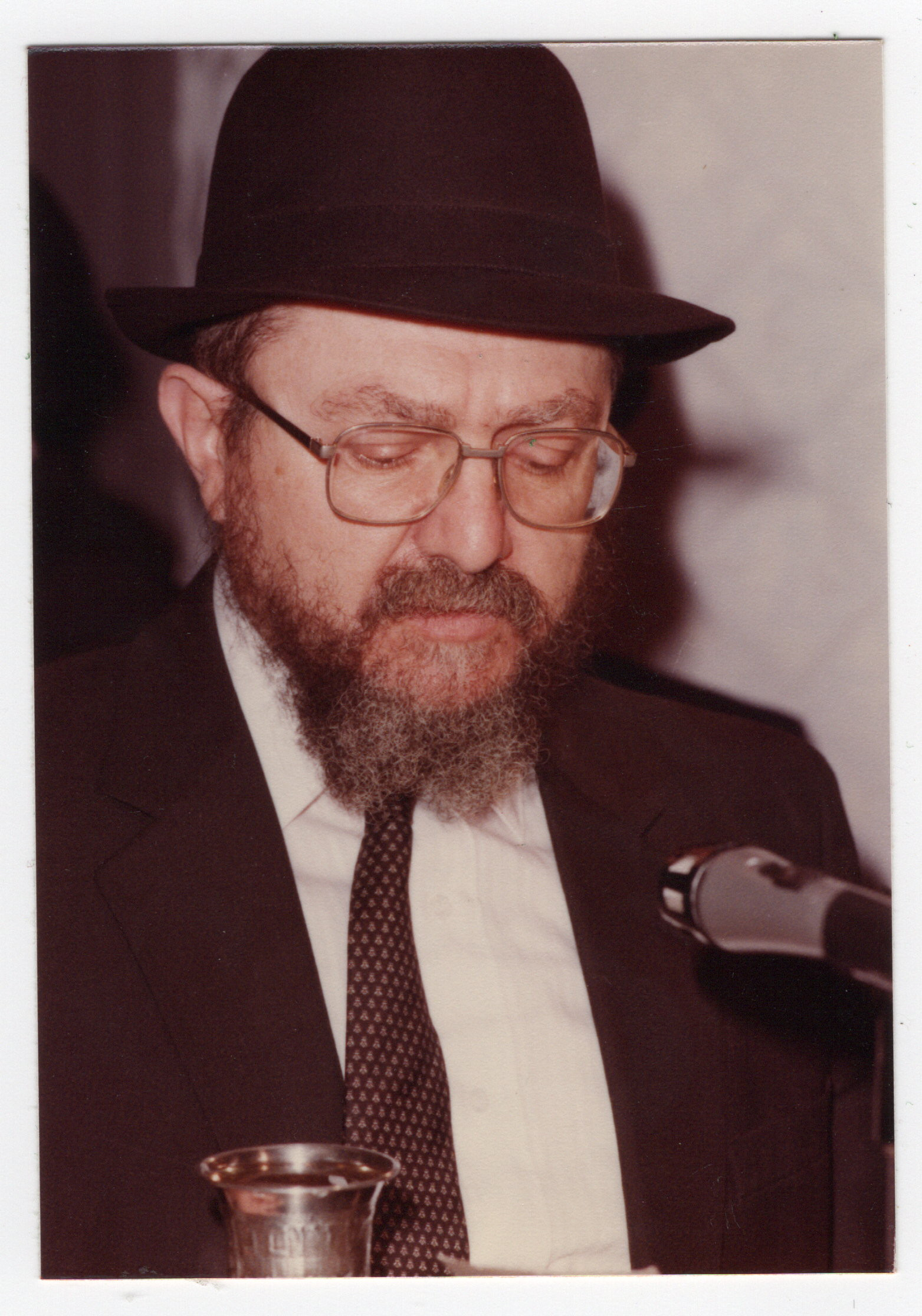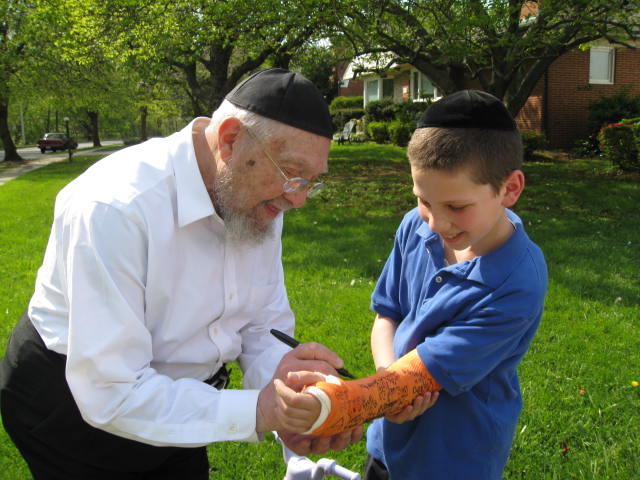Reb Dovid is a brand new biography published by ArtScroll/Mesorah Publications depicting the life and legacy of Rav Dovid Feinstein zt”l. Born to one of the greatest poskei hador of his time,
Rav Moshe Feinstein zt”l, Rav Dovid himself was a phenomenal masmid and illui. Yet Rav Dovid carried his incomparable yichus and many accomplishments lightly, with a sweetness and humility that only emphasized his Torah greatness.
He was a quiet man, content to sit and learn day and night in the MTJ bais medrash that was his second home for eight decades. And yet, with the achrayus for the klal that also defined him, he taught and influenced thousands, beloved by talmidim and virtual strangers alike for his compassion, deep understanding of human nature, and gentle smile.
He was, as one of America’s leading roshei yeshivah said of him, a man who was “kulo Torah” – whose essence was Torah. “Kulo Torah” included care and consideration for others – the ability to understand the needs of the talmidim who were so drawn to him, of petitioners who came to him pleading for tefillos and brachos, of shoppers who stopped him in grocery store aisles with halachic questions, and of his people, his neighbors and friends on his beloved Lower East Side.
Reb Dovid is a book about the many aspects of Torah greatness that a person can achieve – a book that helps us achieve greatness as well.
Purchase the new biography at your local Hebrew bookstore or at ArtScroll.com
The following are some anecdotes from this new book, a volume packed with stories of upliftvand inspiration.
• • • • •
Talmidim were privileged to witness a rare scene one Sunday when a visitor stood there after Reb Dovid’s weekly shiur was over, challenging the Rosh Yeshivah on a certain psak. He was relentless, and kept asking, “What is the Rosh Yeshivah’s mekor to say like that?”
Uncharacteristically, Reb Dovid looked at him and told him to get a pen and paper. Then, Reb Dovid started to list off mareh mekomos — sugyos in the Gemara, Rishonim, nosei keilim on the Shulchan Aruch, and teshuvah sefarim, speaking for several minutes as the gentleman wrote, filling a page with sources until Reb Dovid stopped and said, “Ayein sham, look in those places, and you will see a mekor.”
• • • • •
He didn’t generally discuss the chiddushim found in sifrei Acharonim, using just the Gemara itself and quoting from the Rambam or Shulchan Aruch. On the day before a new zman, a talmid noticed him heading to the shelf of sifrei Acharonim in the back of the beis medrash. Reb Dovid withdrew a Pnei Yehoshua from the shelf and started to learn it, from the beginning. He stood there, in the same spot, for several hours, learning the entire Pnei Yehoshua on Masechta Bava Kamma, turning page after page, as if reviewing a book with which he was familiar, until he reached the final page, and then he replaced it on the shelf.
• • • • •
A talmid chacham came to speak with Reb Dovid, and he was immediately confronted by the unexpected sight — one familiar to talmidim in the yeshivah — of Reb Dovid restocking the soda machine in the yeshivah’s front hallway. The visitor was stunned and tried to do the task, but Reb Dovid didn’t let.
“It is my mitzvah,” he said simply, not understanding why the other person would try to take it.
“But it is not appropriate for the Rosh Yeshivah!” the visitor argued.
“What’s your mekor, your source, that this is called “eino l’fi k’vodo”? Reb Dovid asked. “It brings in money for Torah, so to me it’s a great kavod.”
• • • • •
One of Reb Dovid’s close talmidim had learned under several other great geonim before he had come to MTJ.
“I learned by Reb Dovid for the fewest years, but I learned the most Torah from him. I wondered how that could be,” this talmid reflects, “and then I realized that he was getting shailos on kol haTorah kulah, the entirety of Shulchan Aruch and beyond, so just by sitting and listening to his routine conversations I was being exposed to all of that.”
He describes the scene. “Bachurim would call from their yeshivah pay phones to discuss new shavers, listing model numbers, and Reb Dovid was as patient and humble as a neighborhood rav in a small shul as he answered each one. The Rosh Yeshivah kept a lift-and-cut shaver in his drawer and he would use it to show people how to dull the blades, when the situation called for it, in order to make the shaver permissible for use. He could be displaying the shaver to a visitor, while a child from the cheder popped in to ask what berachah to make on a wafer; then a call would come in with a question about a woman in labor, the doctors unsure whether to save the mother or the baby. Reb Dovid answered each with the same confidence and composure, moving seamlessly between the parts of Torah, his voice and demeanor the same regardless of the complexity of the question.
“Then there were the shailos that were uniquely his, the type that poskim elsewhere had said, ‘Only Reb Dovid could answer this,’ and those of us privileged to listen and hear those shailos were exposed to yedios that we might never have known.”
The talmidim would look on in awe at the way the entirety of Torah seemed to be spread out before their rebbi.
A talmid was walking Reb Dovid to breakfast one morning and said that he had a difficulty with a Gemara on Masechta Shabbos 147b — a masechta unconnected to anything being learned formally in yeshivah that zman. Reb Dovid stopped walking and stood in place for about ten seconds, then nodded and said, “Okay.”
He was ready, the Gemara in front of him.
“There was another unique feature to the Rosh Yeshivah’s psak,” notes a prominent posek. “You didn’t need to follow up with him. His initial answer somehow covered all eventualities, in just a few words. It could be a medical shailah asked on a Friday, and his teshuvah would incorporate the medical aspects, the Shabbos aspects, and the practical aspects. Sometimes, you didn’t think he heard the whole question, but his grasp was so quick that he heard exactly what you were saying, understood the implications, and addressed every part of it in his brief answer.”
He had respect for the opinions of doctors, and often sought advice from a small network of doctors he trusted, but at the same time, a very strong sense of bitachon was part of the decision-making process.
A caller once shared the doctor’s prediction regarding a certain course of treatment and its devastating side effects. Reb Dovid listened, then said, “The side effects are just speculation. It will be fine. Don’t worry about that part.”
It was obvious that Reb Dovid had a clear line in his mind between what was fact and what was not, his guidance a perfect interplay between bitachon and deep understanding of medical realities.
A respected rav was charged with administering a fund to help a widow in his community, and he had several questions.
“The questions were tricky, pitting what was good for her against what she wanted, and in the Rosh Yeshivah’s answer, there was this perfect blend of mastery of halachah and true compassion. I had researched this topic beforehand and was fluent in all the contemporary teshuvos on these halachos,” recalls the rav, “and I don’t know if Reb Dovid had read them all, but he certainly anticipated every single one of their svaros and took them into account.”
• • • • •
At a chasunah, a donor to MTJ noticed Reb Dovid at the sweet table, filling a napkin with a few small cakes. Seeing an opportunity to do something for a great man, he hurried over. “The Rosh Yeshivah likes these cakes? I will send him a truck full of this cake for Shabbos. He doesn’t have to wrap them up to go.”
Reb Dovid smiled and started to walk toward the women’s section, the younger man following him. Reb Dovid asked someone to call the Rebbetzin, and when she approached, he handed her the napkin.
“Here,” he said, “I noticed some of the cake you like, so I brought it for you.”
A talmid of MTJ had become a popular tour guide in Eretz Yisrael, and when Reb Dovid and the Rebbetzin visited, he took them on a private tour of the mekomos hakedoshim. They started in Kever Rachel, which was a special experience for them. They were meant to continue to Me’aras HaMachpelah, in Chevron, but Reb Dovid asked the driver to return to the hotel instead.
Reb Yissocher Ginzberg, who was accompanying them, was worried that Reb Dovid didn’t feel well, but the Rosh Yeshivah assured him that he felt fine. He had decided against going to the Me’aras HaMachpelah, he said. He explained that the Me’aras HaMachpelah had many steps to climb and the Rebbetzin, who used a walker, would not be able to navigate them.
The Rebbetzin insisted that she didn’t mind. “The bottom of the steps in the Me’aras HaMachpelah is also a holy place,” she said good-naturedly, knowing how much tefillah meant to her husband, but Reb Dovid had made up his mind.
“A whole year,” he explained to Reb Yissocher, “I am busy with the yeshivah, with giving shiurim, with answering shailos, and with klal issues. I have so many obligations outside the house. Now, I am on a very rare vacation with my wife, and I will be with her. If she cannot go in, I won’t go in either.”
Reb Dovid was in Lakewood for a parlor meeting on behalf of Rav Michel Feinstein’s kollel. It was toward the end of his life, and there was a large crowd waiting to greet him. When Reb Dovid entered the house, there was a commotion. Reb Dovid turned to the host, his talmid Ezra Beyman, and asked if he could have privacy for a moment to make an important phone call.
Everyone in the Rosh Yeshivah’s entourage had cell phones, so the host reasoned that the call must be very private. He led his rebbi to his study, where Reb Dovid sat down.
And called the Rebbetzin.
He asked about her day, and told her a bit about his day. He asked what she would be eating for supper, and wished her a pleasant evening. She had been alone in the apartment all day, he explained, while he circulated and met people and went to different homes. He wanted to include her in his activities, because she was his partner.
The Rosh Yeshivah’s face, recalls Reb Ezra, was like that of a chassan speaking to his kallah, more than sixty years after his chasunah.
Then Reb Dovid went to greet the participants, the important phone call completed.
• • • • •
The daily post-Shacharis Mishnayos shiur finished a masechta, and in honor of the siyum, someone set out some kichel, herring, and a bottle of whiskey. Reb Dovid partook in the impromptu festivities and a concerned observer wondered if there was a halachic source to make a siyum on a masechta of Mishnayos. Reb Dovid considered the question and shared a fundamental part of his philosophy. “We have been in galus for a long time,” he said, “and when reasons to celebrate come our way, we should use them. Being b’simchah in galus does not need a mekor,” he concluded as he pointedly reached for a l’chaim.
